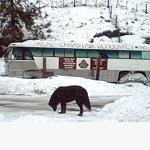| Author | Message | ||
| Ken Smith (Bikerider103152)
Registered Member Username: Bikerider103152 Post Number: 1 Registered: 7-2009 Posted From: 216.120.157.74 Rating: N/A |
What additive is the best to use in an 8v71 when running on the new ultra low sulphur fuel? | ||
| Luvrbus (Luvrbus)
Registered Member Username: Luvrbus Post Number: 759 Registered: 8-2006 Posted From: 74.33.54.207 Rating: |
None, it's all snake oil 71 series do great on the new fuel thats what DD wanted for 50 years fuel with no or low sulphur good luck | ||
| Bob MacIsaac (Wildbob24)
Registered Member Username: Wildbob24 Post Number: 41 Registered: 5-2007 Posted From: 68.155.149.73  Rating: |
You may want to read this recent thread: http://www.busnut.com/bbs/messages/11/30592.html?1252283957 | ||
| Len Silva (Lsilva)
Registered Member Username: Lsilva Post Number: 286 Registered: 12-2000 Posted From: 24.164.20.23  Rating: N/A |
Just fill the tank and drive. | ||
| R.C.Bishop (Chuckllb)
Registered Member Username: Chuckllb Post Number: 908 Registered: 7-2006 Posted From: 75.210.83.248 Rating: N/A |
 RCB | ||
| clint hunter (Truthhunter)
Registered Member Username: Truthhunter Post Number: 472 Registered: 1-2009 Posted From: 24.129.237.52  Rating: N/A |
I heard this new ULSD is so fantastic, you don't even need to put it in your tank, just fill a jug, stick it in the bays and drive. ... but of course ,I learned long time ago to stop believing and do the work required to find as many facts as possible to formulate informed decisions... you may often tell if someone is sharing a belief by asking a few details on the subject and listen to there answers which might indicate a sound understanding or just repetition of there belief in a statement they pick up from someone they choose to trust. FWIWTA1 - the archives really do have a lot on this subject, I would recommend starting with newest archives first & work back. Perhaps you will be able to bring a few amalgamations of fact & belief forward to this thread , when you have time. Technology is always changing ! | ||
| clint hunter (Truthhunter)
Registered Member Username: Truthhunter Post Number: 473 Registered: 1-2009 Posted From: 24.129.237.52  Rating: N/A |
Sorry 103152 forgot to mention , the archives are accessed from the main page. ...welcome aboard the BNO to you & your MC 5A... | ||
| Tom Christman (Tchristman)
Registered Member Username: Tchristman Post Number: 117 Registered: 1-2006 Posted From: 66.218.33.156 Rating: N/A |
I have been running ULS Diesel in my '84 Mercedes 300 turbo diesel for over 3 years already with no ill effects. The fuel manufacturers went to great pains to add additives at the refineries to make adding extra additive unnecessary. The only time you should add anything is if you'll be in sub freezing weather for a long period of time-and that was the same with the old style Diesel. So as previously mentioned-put the fuel in and just drive. Good Luck, TomC | ||
| Ken Smith (Bikerider103152)
Registered Member Username: Bikerider103152 Post Number: 2 Registered: 7-2009 Posted From: 216.120.157.74 Rating: N/A |
Thanks to all for the information. | ||
| Austin Scott Davis (Zimtok)
Registered Member Username: Zimtok Post Number: 367 Registered: 9-2006 Posted From: 216.37.73.226  Rating: N/A |
OK, ULSD is great the way it is, no need to add anything to compensate for the reduced sulfur, but is there any need to use an additive to help keep the fuel system clean? Remove contaminants such as water? Fuel stabilizer to prevent fuel from going bad? Can you add something to help its performance? Is ALL Diesel the same no matter where you buy it? If not then what are the differences? It may be my imagination but I swear that some places I get fuel effect how my bus runs. I drive the same routes weekly so I know how fast (slow) my bus is when getting up to speed on certain stretches of road. Sometimes I get fuel from other places because it is covenant. I then notice either better or worse acceleration for a couple weeks until I refill from my normal places. Is this due (at least in part) to the fuel change, or something else? . | ||
| Luvrbus (Luvrbus)
Registered Member Username: Luvrbus Post Number: 760 Registered: 8-2006 Posted From: 74.33.54.207 Rating: N/A |
Austin, I find heat comes into play with preformance on the new fuel. When I got down to a 1/2 of tank and the fuel was hotter my 8v92 seemed like it lost power also. Last year I installed a fuel cooler like the newer units have and never notice any difference now good luck | ||
| Rob Norgren (Robsedona)
Registered Member Username: Robsedona Post Number: 70 Registered: 11-2007 Posted From: 75.211.216.179  Rating: N/A |
Luvrbus how does the fuel cooler install and how big of a unit is it??? and Who makes it??? | ||
| Bruce Henderson (Oonrahnjay)
Registered Member Username: Oonrahnjay Post Number: 448 Registered: 8-2004 Posted From: 70.60.107.113  Rating: N/A |
"I have been running ULS Diesel in my '84 Mercedes 300 turbo diesel for over 3 years already with no ill effects. The fuel manufacturers went to great pains to add additives at the refineries to make adding extra additive unnecessary." Ummm, no, actually. The fuel manufacturers *TELL* you that they went to great pains, but not so. During the time to establish the ASTM standard for ULSD, it became clear that "just making ULSD" would give you about a 700 figure on the wear-ball scar test. The oil company reps stated that they could easily put in additives to give a 560 test number (lower number = better) but the EMA (US trade group for diesel engine manufacturers) was concerned than anything over low 500's would cause pump/injector wear and Bosch (maker of most of the lighter-duty diesel equipment) was lobbying for 480. Since it's fairly cheap to go from 700 to 560 and more expensive to get down to the 480-500 level, the oil companies overruled the engine/diesel equipment manufacturers and the fuel out there is only mandated to meet 560. And anybody who thinks that there isn't water in any fuel you'll find out there needs to talk to me about some real estate in Florida -- it's owned by the Easter Bunny now, but I can get you a good price on it. The oil companies are my friend and I trust them to really spend more money than they have to to protect me and my bus. Yeah. (Message edited by oonrahnjay on September 09, 2009) | ||
| Tom Christman (Tchristman)
Registered Member Username: Tchristman Post Number: 118 Registered: 1-2006 Posted From: 66.218.33.156 Rating: N/A |
This last week, I was in Portland, Or at the Freightliner test center. They have a fleet of trucks that run just about 24 hours a day to see what breaks. They get their fuel delivered straight from a major fuel distributor and buy normal pump fuel also on the road-no additives. The only time is when the temp is low for water dispersal. If you want to spend a lot of money on advertised fuel improvers-go for it. Personally-fuel prices are high enough without adding to it. Besides, how many miles a year do you do? If the bus sits, maybe some stabilizer would help. Good Luck, TomC | ||
| Sean Welsh (Sean)
Registered Member Username: Sean Post Number: 966 Registered: 1-2003 Posted From: 67.142.130.16  Rating: N/A |
As we've said here many times, you don't want to compensate for "lost sulfur" -- sulfur is bad for engines. It is not the lack of sulfur that causes the problems with lubricity or seals. It is the reduction of aromatic hydrocarbons, which is merely a side-effect of the process used to remove the sulfur. What is being replaced by the additive package is the lubricity formerly provided by the aromatic hydrocarbons naturally occurring in the fuel.
No. Actually, one of the very real problems with ULSD is that it is a much better solvent than LSD, which in turn is a better solvent than HSD. So many operators experienced plugged filters in the first 10,000 miles or so of ULSD operation, as the new fuel cleaned years of deposits and accumulations out of older fuel systems. So when you first start using ULSD, change your filters more frequently, perhaps half-interval, for the first year/10,000 miles.
True. And if I had a modern, high-pressure common-rail diesel with close injector tolerances, I might be concerned about this (but just a little). On a Detroit two-stroke it is a complete non-issue. These things will run on straight vegetable oil, jet fuel, CONUS military fuel, and even bunker oil if you heat it first. Most of us will never see an injector (or pump) problem due to fuel lubricity in the lifetime of our engines, and we end up replacing the injectors due to other, more prevalent problems. JMO, FWIW, YMMV, etc. -Sean http://OurOdyssey.BlogSpot.com | ||
| Luvrbus (Luvrbus)
Registered Member Username: Luvrbus Post Number: 761 Registered: 8-2006 Posted From: 74.33.54.207 Rating: N/A |
Rob, mine is a Dana brand forgot were I bought it but will check on it for you. Mounts on the return line anywhere you have a good air flow. I think it was a good investment good luck | ||
| Rob Norgren (Robsedona)
Registered Member Username: Robsedona Post Number: 71 Registered: 11-2007 Posted From: 75.211.216.179  Rating: N/A |
Tks Luvrbus Yes I don't think I have good air flow where the line runs It goes right from the 8v71 into the channel running between the wheels and then the middle in compartments with every thing else I guess run it from the 8v71 to the side door and then to the return line Will this extra 5 to 10 feet of line make a difference ??? Sean OK now I know why My Fuel filters Have not worked to good!!!!! Thought they were cutting corners. When did We start to get this ULSD Fuel??? | ||
| Austin Scott Davis (Zimtok)
Registered Member Username: Zimtok Post Number: 368 Registered: 9-2006 Posted From: 216.37.73.226  Rating: N/A |
Sean, Thanks for the great explanations. This clears up quite a bit for me. (looks like I'll be changing my fuel filters this weekend) One question remains... Is all diesel the same no matter where you buy it? Do all oil companies follow the same recipe? . (Message edited by zimtok on September 09, 2009) | ||
| larry currier (Larryc)
Registered Member Username: Larryc Post Number: 274 Registered: 2-2007 Posted From: 205.188.116.203 Rating: N/A |
ULSD is all over the map around Seattle. They mandate ethanol and other additives around the citys but you can get pure diesel away from the citys. I don't even know if reading the pump is good enough to know what you are getting. I ask the tanker drivers, they know. When the bus is going to sit, I have to fuel 70 miles away from home to get straight ULSD. | ||
| Bruce Henderson (Oonrahnjay)
Registered Member Username: Oonrahnjay Post Number: 449 Registered: 8-2004 Posted From: 70.60.107.113  Rating: N/A |
Sean wrote "As we've said here many times, you don't want to compensate for "lost sulfur" -- sulfur is bad for engines." Yes, we've seen this in VW 1.9 and 2.0 diesels (Jetta, Golf, Beetle, and Passat) in North America. Due to the design of the engines, synthetic oil (generally 5W-40) is required. VW recommends an oil change interval (OCI) of 10K miles. On LSD, people were able to run 12-14-15K miles, based on oil testing, in favorable conditions. Since ULSD, it's not uncommon for oil that's being tested to run to 30K with sufficient additive package left, with proper lubricating qualities, and with soot levels comfortably below dangerous levels. The change has been almost miraculous. The change to ULSD has been very good. It's still lower in lubricity than LSD and still carrying suspended water. I'm not sure how sensitive that a 15-25-40 year old bus is to water (I *know* that I don't want any in my high-pressure, emission controlled light-duty engine) but I can't imagine that it will go the fuel system any good. On the other hand, in WWII, U-boats would fill their fuel tanks with water to maintain a constant "trim". They might have a tank that was 75-80% water, and they'd pull the fuel oil off the top and burn it. And that was salt water (once they got much past 80%, they'd pump the top layer into another tank and let the combined contents precipitate). But, then again, they'd overhaul the engines every 100-120 days if possible, too. *Everyone* needs good water sumps/separators along with high quality filtration systems for their bus -- no matter how old technology their engines are. And I feel better with the water-emulsifying qualities of Power Service additive, too. It might not be *needed*, but since I don't drive my bus enough to keep it full of fresh fuel, there will be condensation in my climate. It's my "little insurance". How glad will I be that I saved the $11 dollars a season if I'm stuck on the side of the road at night in a rainstorm with a filter/separator full of water???? | ||
| Bruce Henderson (Oonrahnjay)
Registered Member Username: Oonrahnjay Post Number: 450 Registered: 8-2004 Posted From: 70.60.107.113  Rating: N/A |
Larry, I've never heard of ethanol being required in diesel fuel. A number of "farm states" are requiring a certain amount of "biodiesel", though. That is dangerous stuff - it's a very strong detergent and can pull out enough stuff from an older/"high mileage" system to clog a filter in 20-50 miles. It's hard on rubber or "synthetic rubber-like" seals in a fuel injection system -- at least modern ones; it will completely wreck the seals in older systems. So, it is best to run fuel without "biodiesel" additives unless you're ready to do a lot of maintenance on your fuel system. But ethanol isn't a problem for diesels; I sure wouldn't want it in a gasoline passenger car (but I don't have one of those either). | ||
| Glenn F Campbell (Gfcgfc1)
Registered Member Username: Gfcgfc1 Post Number: 22 Registered: 12-2008 Posted From: 69.171.176.173  Rating: N/A |
Bio-diesel is TOTALLY safe for all diesel made after 1996 .Vehicles made befor 1996 may need to upgrade fuel lines and fuel related rubber products.This is published FACT.Most Heavy Equipment mfg.pay the University of Idaho in Moscow ,Idaho to do the extensive testing for mfg.I hane worked in the Univ .of Idaho's lab on Biodiesel fuel extensively.The fuel is safe up to B100 100% biodiesel.The retailers cut it for profitability.GFC | ||
| Sean Welsh (Sean)
Registered Member Username: Sean Post Number: 967 Registered: 1-2003 Posted From: 72.171.0.138  Rating: N/A |
Yes and no. Fuel is formulated regionally, so diesel you buy in, say, Oklahoma will not be the same fuel you buy in, Say, Wisconsin, even the same week. Also, fuel is formulated seasonally, so fuel you buy in December will not be the same as fuel you buy in June, even at the same station. That said, the fuel you might buy at two different stations in the same town or at the same freeway exit likely came from exactly the same storage tank, and if not that, at least out of the same pipeline or from the same bulk supply. Many cities and even entire counties or in some cases (think Alaska) entire sections of states can support at most one or two refineries, and yet you will see dozens of different fuel brands for sale. Yep -- all those tankers load up at the same refinery. That said, one difference between brands is the additive package. Mind you, this is a much bigger deal in the gasoline market than the diesel market, but there are differences there, too. So while the Chevron truck and the Exxon truck might both fill from the same bulk tank at the same refinery within minutes of each other, each truck will get a different (proprietary, trade secret) additive package added to it before it drives off. So, yes, there are still differences between fuels of different brands in the same market. IMO, in the diesel market, these differences are negligible. I buy diesel based on price alone. In the gasoline market, the packages make a difference, and I consider Chevron to have the best. When I had a car, I would buy on price but try to put a tank of Chevron in every several tankfuls. Now that we have 90-mpg scooters and gasoline price is almost irrelevant, I almost always fill with a major brand -- Chevron, Shell, Exxon/Mobil, and BP all have highly competitive packages.
Depends on where you are. California (where else?) was the first to mandate complete phase-out of LSD in favor of ULSD, and IIRC it's been close to two years there now where only ULSD has been available at the pumps. OTOH, the older LSD is still available at on-highway dispensers in quite a number of states; I'd have to look up when the phase-out deadline is, but 2012 sticks in my head. Where you are, in AZ, I think both have been available for two years, often side by side in the same station, but I can't recall seeing anything but ULSD the last time I went through there. There will be a sticker on the pump saying if it is ULSD, and a different sticker warning against using it in post-2007 engines if it is not. And in AZ, that will be next to the sticker saying you'll go to jail for filling your truck (or 3-axle motor home) from the lower-price car dispensers.
Good point, and I will allow for a third circumstance in which an additive is appropriate (in addition to gelling problems and bacterial growth that I mentioned earlier), which is water intrusion. That said, I am in favor of a water separator in the fuel delivery system instead; I use a Fuel Pro. Bottom line, though, is that if you are going to have fuel sitting in the tank longer than a couple months, stabilizing it is a good idea, or polishing it before use. We don't ever "store" our bus, so this is not an issue for us. -Sean http://OurOdyssey.BlogSpot.com | ||
| Glenn F Campbell (Gfcgfc1)
Registered Member Username: Gfcgfc1 Post Number: 23 Registered: 12-2008 Posted From: 69.171.176.173  Rating: N/A |
Bio-diesel is TOTALLY safe for all diesel made after 1996 .Vehicles made befor 1996 may need to upgrade fuel lines and fuel related rubber products.This is published FACT.Most Heavy Equipment mfg.pay the University of Idaho in Moscow ,Idaho to do the extensive testing for mfg.I hane worked in the Univ .of Idaho's lab on Biodiesel fuel extensively.The fuel is safe up to B100 100% biodiesel.The retailers cut it for profitability.GFC | ||
| Rob Norgren (Robsedona)
Registered Member Username: Robsedona Post Number: 73 Registered: 11-2007 Posted From: 75.211.216.179  Rating: N/A |
OK What Kind of Fuel lines do I need to change to I just redid two of the big Lines from the Filters to the bottom in lines on the 8V71 and still have 20' of this old Line :-( and what else will I need to change for this biodiesel they will be adding? Do they have new line that will fit my old Fittings? Rob | ||
| R.C.Bishop (Chuckllb)
Registered Member Username: Chuckllb Post Number: 910 Registered: 7-2006 Posted From: 75.211.209.33 Rating: N/A |
How come I just keep "movin'" along, no matter where I may purchase fuel....USA, Canada, North to South...East to West??? Could it be I have a Cummins? And it is 45 years old....  What have I been missing out....on? I understand the discussions...don't understand the dilemma! Fuel up...move on...as someone said. RCB | ||
| Austin Scott Davis (Zimtok)
Registered Member Username: Zimtok Post Number: 369 Registered: 9-2006 Posted From: 216.37.73.226  Rating: N/A |
. [ I Understand the discussions...don't understand the dilemma! ] ___________________________________________________________________ RC, No real dilemma... This is kind of like reading the ingredients of a food package. Knowing what you put into your body helps you understand how/why you feel the way you feel. and what possible vitamin supplements you may need to live healthy. Knowing what your putting into your bus helps you understand how/why it runs the way it runs, and if you may need to do something to help it run at peak performance. What did I get out of this discussion? Additives are not needed by everyone, but may be a good idea. It depends on your use of the bus. I drive weekly so probably none needed for me. But I may need to look into replacing my filters more often, and at some point upgrade my fuel system components to better deal with the new fuels. _______________________________________________________ | ||
| larry currier (Larryc)
Registered Member Username: Larryc Post Number: 275 Registered: 2-2007 Posted From: 205.188.116.203 Rating: N/A |
2 stroke DD engines mostly use 2 filters. If you have plugged filter issues it is almost always the primary filter. I change one at a time and usually only when they plug. It is also a lot easier to get the 2 stroke running again if you change one at a time without a pump of some kind. As clean as todays fuel is unless you have tank issues a filter should last a long time. Single filter apps on my highway rigs are going a year of everyday running without plugging. | ||
| FAST FRED (Fast_fred)
Registered Member Username: Fast_fred Post Number: 947 Registered: 10-2006 Posted From: 76.202.165.190  Rating: |
As clean as todays fuel is unless you have tank issues a filter should last a long time. Unfortunatly in some states the use of 2% bio diesel and others 5% is mandated, And NO! they don't have to tell you. So there is some point where the "new" fuel will do what all bio diesel does , strip all the gunk from the tank and lines. Result? Carry Filters! Some tech sources clain the bio will "carry" rather than drop out water. Any water will be stuck to the media in your primary , instead of dropping off to be easily drained. Carry filters!And use PLENTY of fuel dope in zero conditions as its not just the fuel wax that's gelling. FF | ||
| Peter E (Sdibaja)
Registered Member Username: Sdibaja Post Number: 311 Registered: 5-2002 Posted From: 201.171.247.150  Rating: N/A |
Fred, may I elaborate? Carry filters, belts, hoses, fluids, water, fuses, etc. Carry the tools to change them all. Know how to do it yourself if possible or at least learn enough to help instruct and assist a younger and smarter person you can recruit! You are the proud owner of ancient technology that is difficult for our youth to understand, and MOST truck stops do not carry spares for them. It is worth your efforts! Peter PS: Learn patience for sitting along the road for a few days when the 1 thing you did not think of has to be found and transported to you. thanks Fred. | ||
| Cullen Newsom (Cullennewsom)
Registered Member Username: Cullennewsom Post Number: 135 Registered: 2-2009 Posted From: 98.200.242.221  Rating: N/A |
Biodiesel and Seed oils as a fuel additive. Canola and Rapeseed oils have been shown in a couple of reputable studies to increase the lubricity of diesel fuel. Here's one a link to one allegedly done by/for the Army. www.biodiesel.org/resources/.../reports/gen/20000501_gen-308.pdf There's another one floating around that was done for the DOE. Unfortunately I couldn't find it. Here's what I got from reading them, and many other papers. Biodiesel which has been derived from seed crops, and cooking oil such as Canola can increase Diesel fuel lubricity (beyond what regular old loaded-with-sulphur diesel fuel had), even by adding only small amounts ~1%. Lubricity - do you need it? Well, since the ASTM value of lubricity measure is derived by rubbing metal together, my gut instinct is that lubricity is good for diesel engines, their parts being made of metal and all, and that more lubricity == less wear, and less wear == lasts longer. Is ULSD lower in lubricity? If yes, then the life of fuel system parts that rub together is going to be lower. With regards to fuel system cleaning: Biodiesel, Canola, and Rapeseed have all been shown to be "cleaner", than any petro-diesel, and problematically so; such that in switching from petro to bio, one can expect to clog up a few filters due to the solvent action of bio, on the deposits left by the petro. So, don't over-do it. Other problems one may encounter. High acid is bad. Water is of course bad. Too much glycerine is bad, which is why I personally avoid Waste Veg. Oil. In small amounts neither Biodiesel nor Canola oil will hurt anything. And, it might help. Personally, I keep a couple gallons of food-grade Canola in the toolbox. I occasionally add some to the fuel in my pickup truck. It once got me out of a jam when I ran out of fuel. The exhaust smell really does make you hungry. I don't bother with OTC fuel system mojo, since it is super-expensive, and probably not superior to a jug of Canola oil. The exception to that is anti-fungal / anti-bacterial additives, which, if you need them, you know it. |